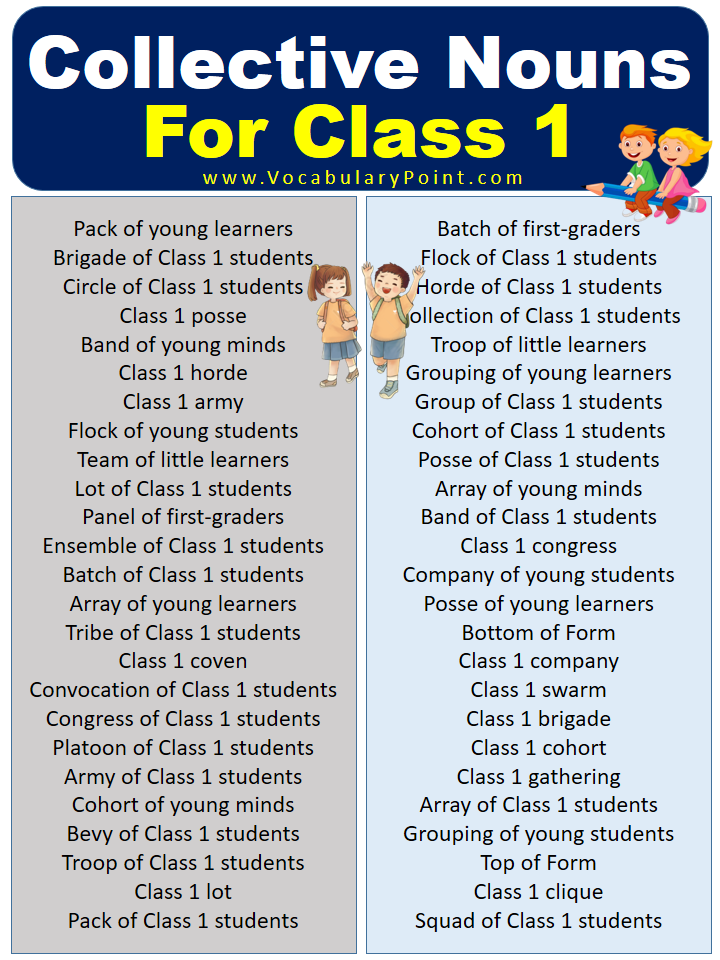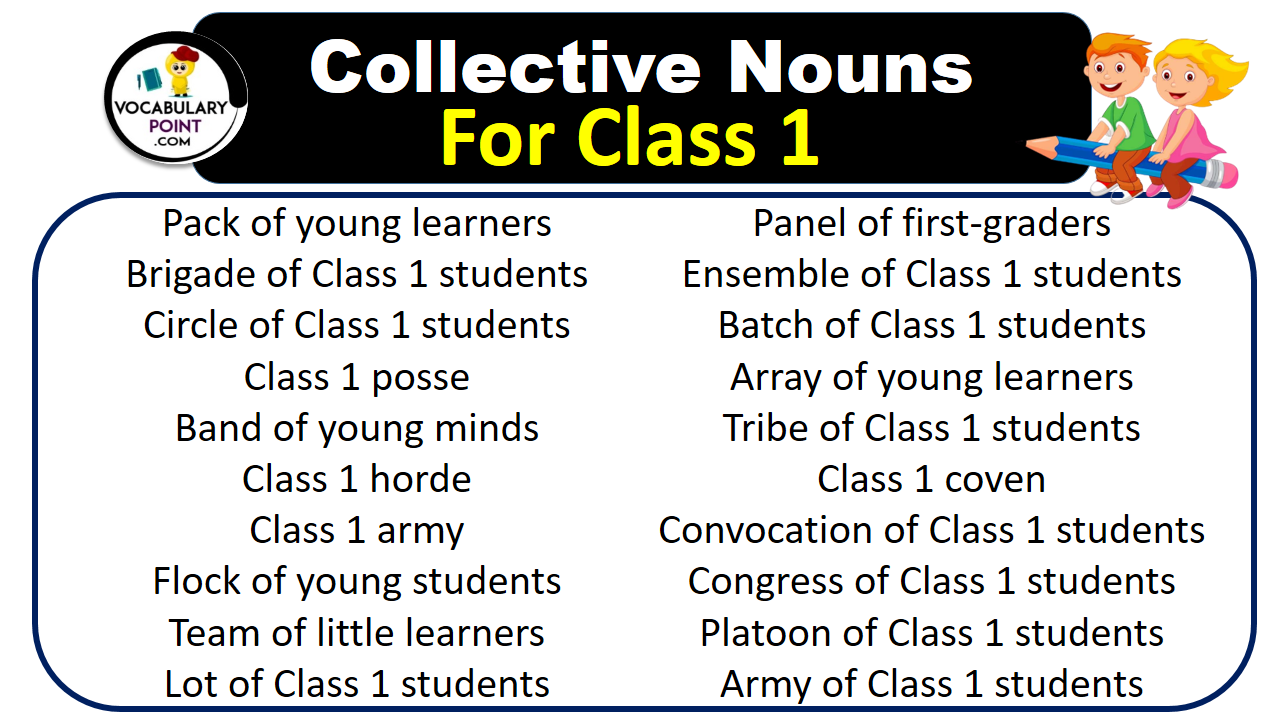Collective nouns are an essential part of the English language, allowing us to describe groups of people, animals, or objects. For Class 1 students, learning about collective nouns not only enhances their vocabulary but also helps them understand how words can be used to represent a collection. In this article, we will explore various collective nouns that are suitable for Class 1 learners. Each noun will be accompanied by its meaning and examples, making it easier for young minds to grasp the concept and incorporate these words into their everyday conversations and writing. So let’s dive in and discover the fascinating world of collective nouns together!
What is the Collective Noun For Class 1?
The collective noun for a group of students in Class 1 is typically referred to as a “class” or a “first-grade class.” For example, you could say, “The class 1 students went on a field trip,” or “The first-grade class performed a play.” In these cases, “class” or “first-grade class” is used to denote the entire group of students in that particular grade level.
Here are the 10 Collective Nouns For Class 1:
- Bunch of Class 1 students
- Assembly of Class 1 students
- Herd of Class 1 students
- Flock of Class 1 students
- Team of Class 1 students
- Swarm of Class 1 students
- Group of Class 1 students
- Pack of Class 1 students
- Tribe of Class 1 students
- Cluster of Class 1 students
Collective Nouns For Class 1
- Pack of young learners
- Brigade of Class 1 students
- Circle of Class 1 students
- Class 1 posse
- Band of young minds
- Class 1 horde
- Class 1 army
- Flock of young students
- Team of little learners
- Lot of Class 1 students
- Panel of first-graders
- Ensemble of Class 1 students
- Batch of Class 1 students
- Array of young learners
- Tribe of Class 1 students
- Class 1 coven
- Convocation of Class 1 students
- Congress of Class 1 students
- Platoon of Class 1 students
- Army of Class 1 students
- Cohort of young minds
- Bevy of Class 1 students
- Troop of Class 1 students
- Class 1 lot
- Pack of Class 1 students
- Batch of first-graders
- Flock of Class 1 students
- Horde of Class 1 students
- Collection of Class 1 students
- Troop of little learners
- Grouping of young learners
- Group of Class 1 students
- Cohort of Class 1 students
- Posse of Class 1 students
- Array of young minds
- Band of Class 1 students
- Class 1 congress
- Company of young students
- Posse of young learners
- Bottom of Form
- Class 1 company
- Class 1 swarm
- Class 1 brigade
- Class 1 cohort
- Class 1 gathering
- Array of Class 1 students
- Grouping of young students
- Top of Form
- Class 1 clique
- Squad of Class 1 students
- Herd of Class 1 students
- Class 1 assembly
- Class 1 troupe
- Class 1 squad
- Class 1 array
- Class 1 party
- Swarm of Class 1 students
- Class 1 circle
- Gathering of young minds
- Cast of Class 1 students
- Panel of Class 1 students
- Throng of Class 1 students
- Cluster of Class 1 students
- Bunch of Class 1 students
- Assembly of young minds
- Gathering of Class 1 students
- Set of Class 1 students
- Team of Class 1 students
- Coterie of Class 1 students
- Class 1 panel
- Clique of Class 1 students
- Assembly of Class 1 students
- Coven of Class 1 students
- Association of Class 1 students
- Party of Class 1 students
- Cluster of young students
- Class 1 ensemble
- Assembly of little learners
- Class 1 bevy
- Collection of first-graders
- Class 1 pack
- Set of young students
- Class 1 throng
- Company of Class 1 students
- Class 1 association
- Mob of Class 1 students
- Class 1 mob
Related: Collective Nouns For Class 6
Collective Nouns For Class 2

Collective Nouns For Class 1 With Meaning and Examples
- Class
Meaning: A group of students in the same grade or level of education.
Examples:
- Smith’s Class is going on a field trip to the zoo.
- Class 1A won the award for the best-behaved class of the year.
- The teacher praised the whole class for their excellent performance.
- Cohort
Meaning: A group of individuals who started their education together and progress as a unit. Examples:
- The Class 1 cohort will graduate together after completing elementary school.
- The cohort participated in various activities during their first year at school.
- The cohort of young learners showed great enthusiasm during their class activities.
- Assembly
Meaning: A gathering of students, often for school-wide events or presentations.
Examples:
- The school principal addressed the morning assembly about upcoming events.
- The whole Class 1 assembly sang the national anthem during the Independence Day celebration.
- The assembly was entertained with a dance performance by some talented students.
- Troop
Meaning: A group of young students or children, typically engaged in activities together.
Examples:
- The school organized a troop of Class 1 students for a nature hike.
- The troop played games and had fun during the school picnic.
- The teacher led a small troop to the school library for storytime.
- Team
Meaning: A group of students working together toward a common goal or participating in sports activities.
Examples:
- The Class 1 team won the relay race during the sports day event.
- The students formed teams to solve puzzles and brain teasers.
- The team of young learners practiced their dance routine for the school talent show.
- Gathering
Meaning: An assembly or meeting of students coming together for a specific purpose.
Examples:
- The gathering of Class 1 students was held to celebrate the end of the school year.
- The school organized a gathering to discuss ideas for improving the school playground.
- The gathering of young minds involved sharing stories and experiences.
- Flock
Meaning: A group of young students moving together like a flock of birds.
Examples:
- The teacher guided the flock of Class 1 students during the nature walk.
- The flock of children followed the teacher to the art room for a creative activity.
- The flock of young learners excitedly explored the science exhibits at the museum.
- Cluster
Meaning: A small group of students or things close together.
Examples:
- The teacher noticed a cluster of Class 1 students discussing a storybook in the corner.
- The cluster of young minds gathered around the teacher to ask questions.
- The cluster of children worked collaboratively on a craft project.
- Bevy
Meaning: A large group or collection of students, often lively and energetic.
Examples:
- The playground was filled with a bevy of Class 1 students during recess.
- The school auditorium echoed with laughter as the bevy of children enjoyed the comedy show.
- The bevy of young learners sang songs and danced during the school cultural fest.
- Squad
Meaning: A small group of students engaged in a specific task or activity.
Examples:
- The Class 1 squad practiced for the dance competition.
- The teacher formed a squad of students to clean up the classroom after an art project.
- The squad of young minds solved math problems together.
- Bunch
Meaning: A group of students gathered closely together.
Examples:
- The teacher handed out pencils to the bunch of Class 1 students at the front row.
- The bunch of children eagerly listened to the story during storytime.
- The bunch of young learners excitedly presented their science projects.
- Party
Meaning: A group of students having fun and celebrating together.
Examples:
- The school organized a party for Class 1 to mark the end of the academic year.
- The party of students enjoyed games, music, and cake during the birthday celebration.
- The party of young learners danced and sang to celebrate their achievements.
- Platoon
Meaning: A group of students organized for a particular purpose or activity.
Examples:
- The Class 1 platoon marched proudly during the school’s annual sports parade.
- The teacher divided the platoon of students into smaller groups for a scavenger hunt.
- The platoon of young learners participated in a quiz competition.
- Herd
Meaning: A large group of students moving together or gathered in one place.
Examples:
- The herd of Class 1 students made their way to the school auditorium for the assembly.
- The teacher guided the herd of children during the school field trip to the zoo.
- The herd of young learners listened attentively to a guest speaker in the classroom.
- Company
Meaning: A group of students gathered together for companionship or support.
Examples:
- The Class 1 company sat together during lunchtime to share their snacks.
- The school organized a company of students to participate in the spelling bee competition.
- The company of young learners practiced singing songs for the school choir performance.
- Posse
Meaning: A small group of students or friends who often stick together.
Examples:
- The posse of Class 1 students played games together during the recess break.
- The teacher assigned a posse of students to work as partners on a class project.
- The posse of young learners explored the school garden during the nature study session.
- Collection
Meaning: A gathering or assortment of students or things.
Examples:
- The school library had a collection of Class 1 books for young readers.
- The collection of children’s art displayed in the hallway impressed everyone.
- The collection of young minds included a diverse range of interests and talents.
- Horde
Meaning: A large group of students or children, often moving or acting together.
Examples:
- The horde of Class 1 students rushed to the playground as soon as the bell rang.
- The teacher managed the horde of children during the school’s sports carnival.
- The horde of young learners lined up to board the school bus for the field trip.
- Array
Meaning: A varied or orderly arrangement of students or things.
Examples:
- The teacher displayed an array of Class 1 drawings on the classroom bulletin board.
- The array of children’s achievements was showcased during the school’s annual exhibition.
- The array of young learners demonstrated their talents during the talent show.
- Ensemble
Meaning: A group of students or performers who come together to create a harmonious whole. Examples:
- The Class 1 ensemble presented a musical performance during the school concert.
- The school organized an ensemble of students for a drama production.
- The ensemble of young learners showcased their dance skills during the cultural event.
Must Read: Collective Nouns For Class 3
